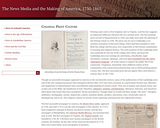
The English colonists in North America in the seventeenth century were part of an early modern global communication network, and yet at the same time, they were painfully isolated. They had been encouraged to risk the three-thousand-mile ocean voyage across the North Atlantic by a steady flow of hopeful reports from the New World that had been circulating in Europe for over a hundred years in the form of explorers’ letters, maps, and travel accounts. But once they were there in the early English settlements at Jamestown, Plymouth, and Massachusetts Bay, they were frequently cut off from the news networks they had previously known: books, pamphlets, newspapers, letters, and face-to-face communication with family and friends. They longed for news from home, especially during the news-drenched decades of civil strife in England beginning in the 1640s. They labored to sustain and improve the transatlantic flow of information and news from England and Europe to America.
This essay and collection of primary sources explores the topic of Colonial Print Culture.
- Subject:
- History
- U.S. History
- Material Type:
- Lecture Notes
- Primary Source
- Author:
- American Antiquarian Society
- Date Added:
- 10/27/2019